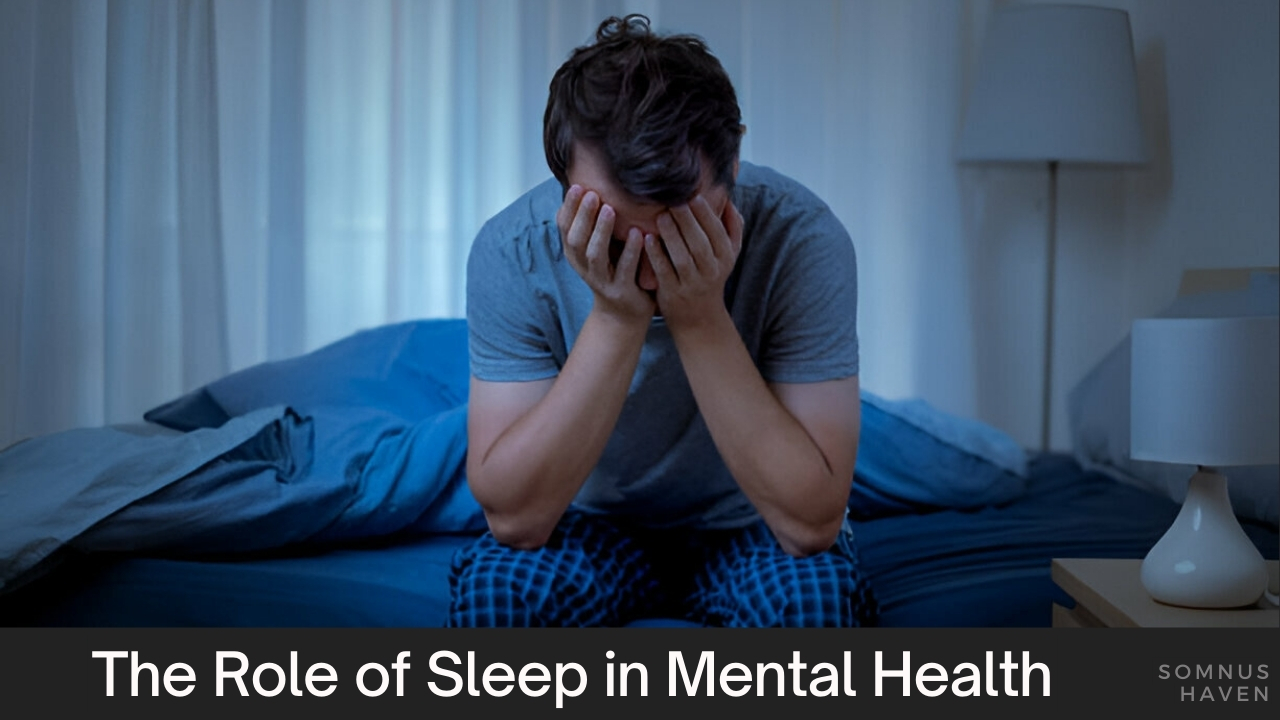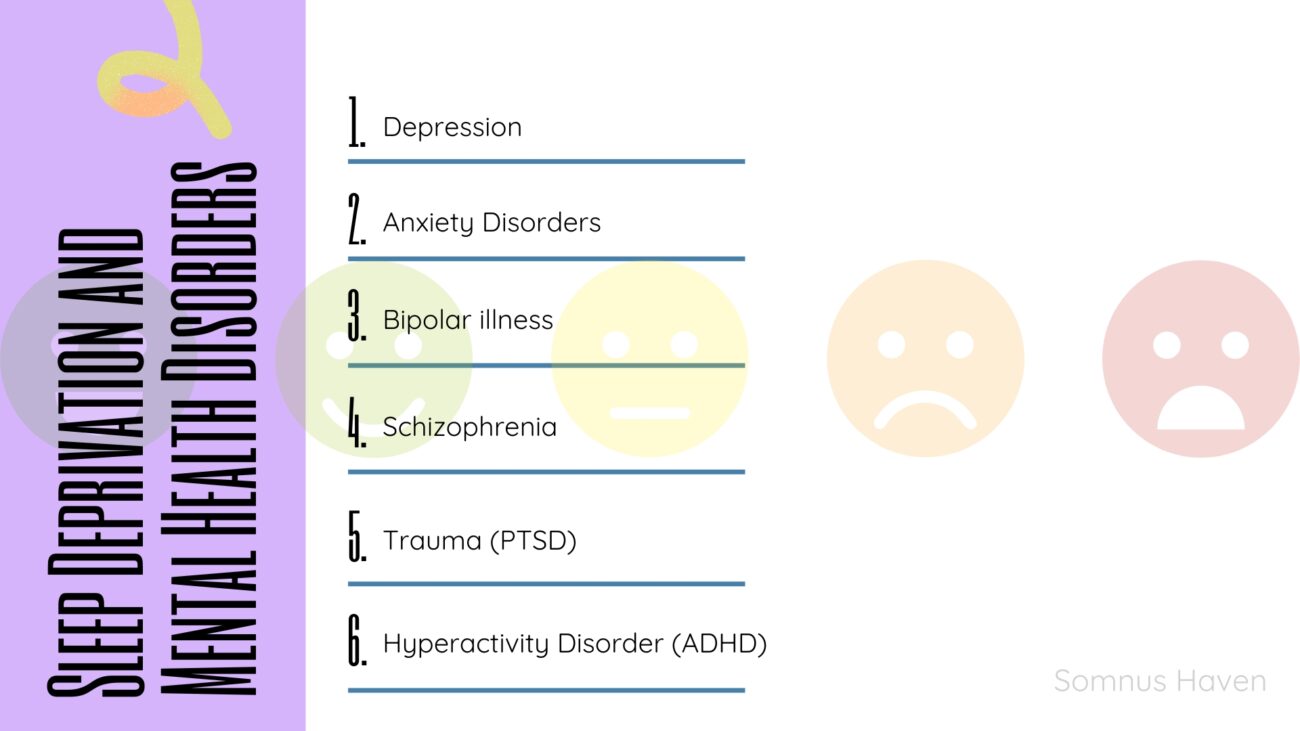The Role of Sleep in Mental Health

Sleep is among the most crucial components of our total health, yet its importance is typically ignored in today’s busy society. Research study consistently highlights the vital role sleep plays in preserving psychological and psychological wellness. Poor sleep quality or chronic sleep deprivation can have serious impacts on cognitive functions, emotional policy, and even long-term psychiatric health.
At Somnus Haven, we think that investing in premium sleep is among the very best decisions you can produce your psychological health. In this blog, we’ll check out the connection between sleep and mental health, backed by scientific research and expert insights.
The Science Behind Sleep and Mental Health
The Sleep Cycle and Brain Function
Sleep is divided into different phases:
- Non-Rapid Eye Movement (NREM) Sleep: This stage consists of light sleep and deep sleep, which help bring back the body, reinforce the immune system, and manage metabolism.
- Rapid Eye Movement (REM) Sleep: This is the stage where dreaming happens and plays an essential role in memory debt consolidation and psychological processing.
Each night, our brains cycle through these phases multiple times, enabling for important functions like hormone regulation, tissue repair, and cognitive processing. When these cycles are disrupted, the brain struggles to control feelings, retain memories, and process daily stressors effectively.
Sleep Deprivation and Mental Health Disorders

Various research studies show a strong link in between chronic sleep deprivation and mental health problems. According to Columbia Psychiatry, sleep deprivation impacts the brain’s capability to regulate feelings and increases the risk of stress and anxiety, depression, and other psychiatric conditions. Some of the most common psychological health conditions associated with sleep disruptions consist of:
1. Depression
- People with sleeping disorders are 10 times most likely to establish anxiety than those who get adequate sleep.
- Rapid eye movement plays a crucial role in psychological processing. A lack of sleep and mental health leads to a boost in unfavorable thoughts and feelings.
- A disrupted circadian rhythm can impact serotonin and dopamine levels, which are vital for state of mind policy.
2. Anxiety Disorders
- Poor sleep increases activity in the amygdala, the brain’s worry center, making individuals more susceptible to irrational fears and stress and anxiety.
- Sleep deprivation likewise minimizes the brain’s ability to control cortisol, the tension hormone, resulting in heightened tension reactions.
- Inadequate sleep can make it harder to focus, aggravating signs of generalized anxiety condition (GAD) and social stress and anxiety.
3. Bipolar illness
- Irregular sleep patterns can trigger manic and depressive episodes in individuals with bipolar illness.
- Sleep deprivation can impair impulse control, resulting in increased emotional reactions.
4. Schizophrenia
- Individuals with schizophrenia often suffer from extreme sleep disturbances, intensifying symptoms like hallucinations and cognitive problems.
- Sleep disturbances can make medication less reliable, causing more severe episodes.
5. Trauma (PTSD).
- Sleep interruptions, especially problems and insomnia, prevail among people with PTSD.
- Poor sleep prevents the brain from effectively processing terrible memories, leading to increased distress and psychological dysregulation.
6. Attention-Deficit/Hyperactivity Disorder (ADHD).
- Lots of individuals with ADHD experience sleep issues such as problem going to sleep and remaining asleep.
- Poor sleep can intensify symptoms such as impulsivity, hyperactivity, and lack of focus.
How Is Mental Health Related to Sleep?

Psychological health and sleep share a deeply interconnected relationship, affecting each other in multiple methods. A great night’s sleep plays a crucial role in emotional guideline, cognitive function, and overall psychological well-being. On the other hand, poor sleep can contribute to or worsen psychological health conditions such as anxiety, anxiety, and stress conditions. Here’s a better take a look at how sleep and mental health are linked:
1. Sleep Regulates Mood and Emotional Stability
- Sleep is important for processing emotions and supporting mood. During sleep, the brain rearranges and consolidates psychological experiences, assisting people much better deal with stress and everyday obstacles.
- Persistent sleep deprivation increases psychological reactivity, making people more prone to mood swings, irritability, and increased stress and anxiety.
2. Sleep Deprivation Increases Anxiety and Stress
- Absence of sleep triggers extreme production of cortisol, the stress hormone, which can lead to a state of heightened awareness and anxiety.
- Research studies reveal that individuals with insomnia are at a much greater risk of developing stress and anxiety disorders.
3. Poor Sleep Contributes to Depression
- Sleeping disorders and sleep disturbances prevail signs of depression. Research suggests that individuals with sleep disorders are 10 times most likely to experience major depressive episodes.
- Sleep impacts neurotransmitter balance, including serotonin and dopamine, which regulate state of mind and sensations of wellness.
4. Sleep Helps with Memory and Cognitive Function
- Rapid eye movement is critical for memory combination and problem-solving capabilities.
- When sleep is compromised, cognitive functions such as attention, decision-making, and learning capability are significantly impaired.
5. Absence of Sleep Can Lead to More Serious Mental Health Conditions
- Long-term sleep deprivation has been linked to serious psychiatric conditions such as bipolar affective disorder, schizophrenia, and post-traumatic tension condition (PTSD).
- Disturbances in circadian rhythms can set off or aggravate symptoms of these disorders, making it harder for individuals to preserve steady mental health.
How to Improve Sleep for Better Mental Health
Given that sleep plays such a crucial role in psychological health, optimizing sleep health can significantly enhance psychological and cognitive well-being. Here are some practical ways to enhance sleep quality:
1. Buy a High-Quality Mattress and Bedding
Your sleep environment plays a significant role in sleep quality. An encouraging, comfy bed mattress assists avoid body aches and improves sleep posture. Somnus Haven offers premium bed mattress, including:
- Puffy Lux Mattress: Ideal for side sleepers and those requiring extra pressure relief.
- Posh Lavish Natural Mattress: Made with sustainable, natural materials that promote healthy sleep and decrease allergens.
2. Maintain a Consistent Sleep Schedule
Going to sleep and awakening at the same time every day helps regulate your body’s body clock, making it easier to fall asleep and get up naturally.
3. Produce a Relaxing Bedtime Routine
Avoid screen time at least an hour before bed to lower direct exposure to blue light, which interferes with melatonin production.
Practice meditation, deep breathing, or journaling to decrease tension and peaceful the mind before bed.
4. Enhance Your Sleep Environment
- Keep your bedroom cool, dark, and quiet for much better sleep quality.
- Use blackout drapes and white sound devices if required.
- Think about aromatherapy with lavender necessary oils, known for promoting relaxation.
5. Prevent Caffeine, Alcohol, and Heavy Meals Before Bedtime
- Caffeine and nicotine are stimulants that can keep you awake if consumed too near to bedtime.
- Alcohol interrupts REM sleep, leading to lower sleep quality and frequent wake-ups.
- Consuming a heavy meal late at night can trigger acid reflux and pain, making it more difficult to go to sleep.
The Role of Premium Mattresses in Sleep Quality

A comfortable and supportive mattress is one of the best investments you can make for your sleep health. A high-quality mattress:
- Reduces pressure points that cause discomfort.
- Regulates body temperature to prevent night sweats.
- Aligns the spine properly to reduce back and joint pain.
At Somnus Haven, we offer luxury mattresses made from natural and sustainable materials designed to support your body and mind. Whether you need extra-firm support, cooling technology, or pressure relief, we have the perfect mattress for you. Explore our premium mattress collection today!
Sleep is not a high-end– it is a requirement for preserving optimal mental health. Persistent sleep deprivation can result in serious psychological and cognitive problems, increasing the danger of stress and anxiety, anxiety, and other psychiatric disorders. By prioritizing great sleep hygiene and investing in a top quality mattress, you can dramatically enhance your total well-being.
At Somnus Haven, we think that a fantastic night’s sleep is the foundation of a healthy and satisfying life. If you’re prepared to boost your sleep quality and take control of your psychological health, explore our collection of premium mattresses and bed linen services today!
Sleep Better, Live Better. Visit Somnus Haven today.









